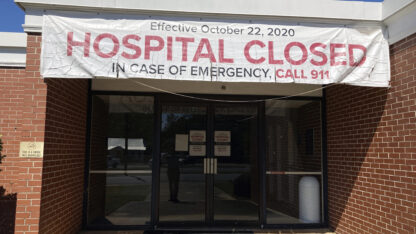Atlanta could be on track to get a new teaching hospital run by Morehouse School of Medicine. It’s an idea being floated as part of legislation that would scale back Georgia’s hospital regulations known as certificate of need.
A new full-service hospital would increase access to health care in the city, more than a year after Wellstar closed its Old Fourth Ward Atlanta Medical Center campus. AMC’s 2022 closure left Grady Memorial Hospital as the Atlanta metro area’s only remaining Level 1 Trauma Center.
House Bill 1339 would ease the decades-old certificate-of-need restrictions governing where health systems can build and expand across the state. It would also increase the tax credit limit for contributions to rural hospitals.
“The Rural Hospital tax credit program has been a game changer and many times the lifesaver for rural Georgia,” said Sen. Billy Hickman, R-Statesboro, one of HB 1339’s supporters.
During the floor debate, Hickman said that reforming certificate-of-need rules would especially help rural communities struggling with few comprehensive health care options.
“If our communities don’t have a hospital, they don’t survive. We’ve always seen that. We’ve seen several of our rural hospitals close, and when those hospitals close, that community dies,” he said. “Nobody wants to live in a community that doesn’t have great access to health care.”
He said he was less satisfied with H.B. 1339’s provisions related to ambulatory surgical centers, saying he worries that the centers would not be required to accept every patient regardless of their insurance status or operate 24 hours per day as a full-service hospital would.
At 18, Georgia is one of the states with the most hospitals at risk of closure, according to a recent report from Chartis. The report found that 26% to 30% of rural hospitals in Georgia are vulnerable.
The analysis cited shrinking reimbursements and operating margins among the reasons for vulnerability.
Roughly another dozen have already shut down over the last decade.
“Bad debt, that is what’s driving a lot of them to the brink of closure, said Monty Veazey, who heads the Georgia Alliance of Community Hospitals. “The uninsured, the high deductibles of insured patients, the Medicaid shortfall. So you combine all that together, and that gives you your total uncompensated care, which is a fantastic number.“
Sen. David Lucas, D-Macon, spoke passionately on the Senate floor in favor of Medicaid expansion to help prevent further closures.
“It’s about money. It’s about money to go to Phoebe Putney, to home health care, all of our hospitals. They get paid something for the folks that they say they are paying in uncompensated care,” said Lucas.
He said the General Assembly does not need a new study committee to examine ways to close the health care access gap in Georgia — a provision included in the latest version of HB 1339.
Georgia is one of 10 states that have not fully expanded Medicaid, which would insure adults with incomes up to 138% of the federal poverty line.
Gov. Brian Kemp and top GOP lawmakers have said the state’s waiver program, called Georgia Pathways to Coverage, needs more time to grow and is a better solution for Georgia than a full Medicaid expansion under Obamacare.
Pathways offers Medicaid coverage for low-income adults earning up to 100% of the federal poverty line who complete 80 hours per month of work, education, volunteering, or other pre-approved activities.
Fewer than 3,000 people enrolled in Pathways in the program’s first six months.
On Thursday, Minority Leader Sen. Gloria Butler voted for the bill but said she would not vote for a final package if it doesn’t include full Medicaid expansion.
She said she supported language in the bill that could clear the way for a new potential Morehouse-run hospital in the metro area.
At a Gold Dome event marking HBCU Heritage Day, Lt. Gov. Burt Jones said he was discussing the idea with Morehouse School of Medicine.
He said Atlanta needs another trauma center to replace AMC, which handled a high percentage of patients who had no insurance or were underinsured.
“And Atlanta is too big of a town, and metro Atlanta is too big of an area to have just one [Level 1 Trauma hospital]. And this mechanism that we’re putting in place right now will enable us to do that,” he said.
After more than an hour of debate, state Senators voted 43 -11 to send HB 1339 to a conference committee with the House.
The legislative session ends in two weeks.










